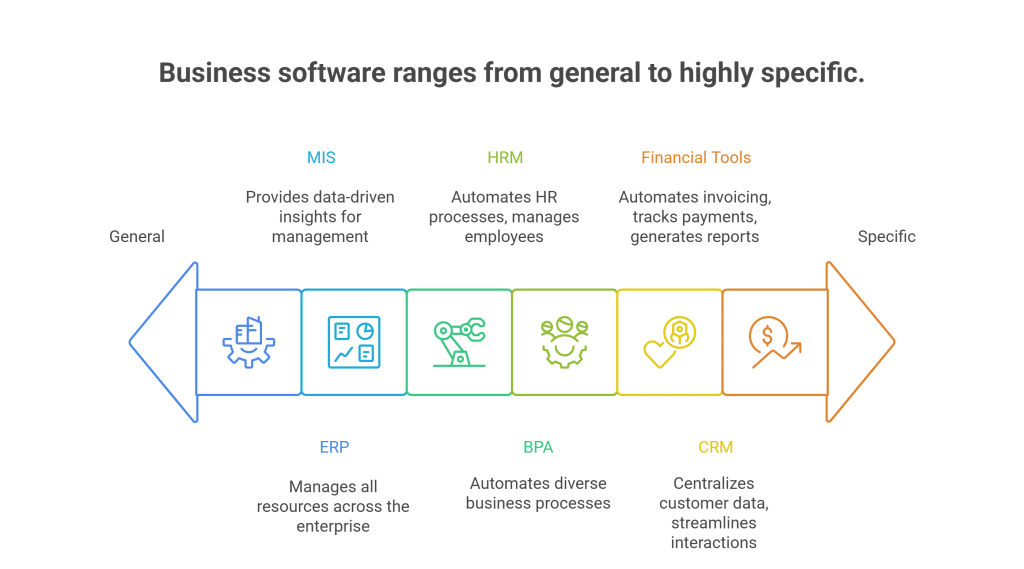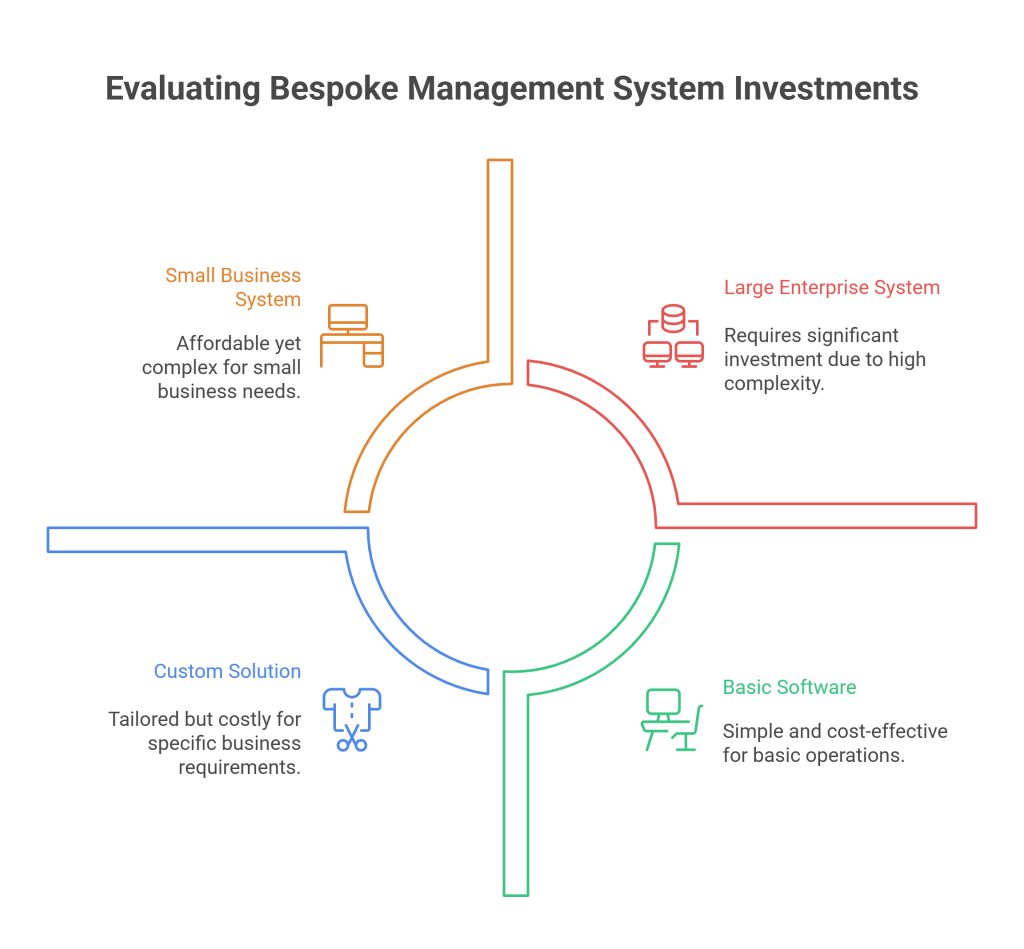Three-quarters of UK businesses believe bespoke software development could help to maximise their efforts. As someone who’s worked with growing businesses, I’ve seen firsthand how a bespoke business management system can transform operations that have become disjointed over time.
Many successful companies that have grown organically over several years develop disconnected processes and information silos along the way. Although standard business management systems might address some basic needs, they often fall short when it comes to your specific challenges. This is where bespoke business software comes into play, offering tailored solutions despite the higher initial investment compared to off-the-shelf alternatives.
In this article, we’ll explore what a bespoke management system actually is, when your business might need one, and the potential benefits and challenges involved. We’ll specifically look at how these custom systems can deliver stand-out user experiences and functionality, while also future-proofing your business and giving you a competitive edge in the market.
What is a bespoke business management system?
A bespoke business management system serves as the backbone of a company’s operations – it’s custom-built software crafted by specialist engineers to address your organisation’s unique needs. Unlike generic alternatives, these systems are designed from the ground up to reflect your specific business processes, terminology, and workflows.
Definition and core purpose
At its foundation, a bespoke business management system is a piece of custom-built software developed specifically for your organisation. It streamlines your business workflows and integrates all your processes into a single, easy-to-use platform. This integration typically includes various modules such as finance, HR, customer relationship management, and more, all working in harmony to accelerate your business operations.
The primary purpose of these tailored systems is to solve the specific challenges your company faces. Furthermore, they provide leadership with real-time understanding of current and future operational challenges. A well-designed bespoke system effectively eliminates potential bottlenecks by being structured around your established processes rather than forcing you to adapt to pre-built frameworks.
Bespoke solutions generally come in three distinct forms:
- Fully bespoke – Designed completely from the ground up, these systems are crafted to perfectly fit your business needs from backend architecture to frontend user experience
- Semi-bespoke – More common due to lower costs and faster development, these solutions use pre-existing infrastructure while implementing your specific business goals
- Bolt-on solutions – These are tailored modifications to off-the-shelf software, adding functionality to meet specific needs while still relying on third-party infrastructure
The core aim of these systems is not merely to perform a function but to integrate your entire operational process, touching almost all parts of your company.
How it differs from standard business management systems
The fundamental difference between bespoke and standard systems lies in their design philosophy. Off-the-shelf solutions are created with a one-size-fits-all approach to meet the basic needs of as many businesses as possible. In contrast, bespoke systems are built to meet the full needs of your specific business.
Standard business management systems often require you to change your working practises to fit their structure. Conversely, bespoke solutions adapt to your existing workflows. This distinction is critical because it determines whether technology serves your business or your business serves the technology.
Beyond this philosophical difference, several practical distinctions separate bespoke systems from their standard counterparts:
Integration and compatibility: Bespoke systems can be designed to integrate seamlessly with your existing software and hardware, ensuring smooth data flow between different systems. Standard solutions often create compatibility issues that lead to data silos and inefficient workarounds.
Scalability and adaptability: Custom solutions grow with your business, accommodating process changes and increased workloads without costly upgrades[62]. You can add new features according to your growth rather than waiting for a vendor to update their product.
Control and security: With a bespoke system, you have complete control over your software. This control extends to security, as bespoke systems are less vulnerable to hacking attempts since attackers would need to both gain access and learn the unique system before exploiting it.

Cost considerations: Though the initial investment for bespoke software may be higher, over time it often proves less expensive as you avoid recurring licencing fees, unnecessary features, and costly adaptations required by off-the-shelf solutions[62].
Most importantly, bespoke systems use your company’s terminology and can be branded according to your corporate guidelines, creating a familiar environment for your team.
Why businesses consider bespoke systems
Business owners increasingly turn to custom solutions when facing complex operational hurdles that standard software can’t effectively address. The decision to invest in a bespoke business management system often stems from recurring frustrations with existing tools that simply weren’t designed for their specific needs.
Common operational challenges
Today’s businesses face numerous operational hurdles that can hamper growth and efficiency. Managing cashflow remains one of the biggest problems, particularly for new entrepreneurs. Even established companies struggle with financial challenges that threaten their survival.
Finding skilled talent presents another significant obstacle. Nearly 87% of employers report difficulties finding qualified IT professionals, a problem that intensifies as businesses expand and require specialists for digital transformation initiatives.
Data fragmentation across multiple disconnected systems creates additional complications. When companies use various software tools that don’t communicate effectively, valuable time is wasted switching between applications. This fragmentation not only decreases productivity but increases the risk of errors through manual data entry and creates information silos that hinder decision-making.
Additionally, as companies grow, processes that worked well initially often become insufficient. The Forbes Business Council notes that “processes that worked well while your team was small may not suffice once your business scales”. This operational complexity can quickly overwhelm systems not designed to handle increased demand.
When off-the-shelf software falls short
Pre-packaged software solutions typically aim to serve a broad audience, consequently failing to address unique business requirements. Moreover, businesses frequently find themselves modifying their operations to match the software rather than vice versa. This fundamental misalignment causes frustration and inefficiency.
Scalability presents another major limitation. Standard software rarely scales effectively as businesses expand, forcing companies to switch solutions as they grow—an expensive and time-consuming process.
Integration challenges further compound these issues. Off-the-shelf products may not integrate seamlessly with existing systems, creating compatibility problems that require additional resources to resolve. This lack of integration leads to disconnected workflows and duplicate data entry across platforms.
Perhaps most significantly, standard software gives businesses virtually no control over development, features, updates, security levels, or support. This dependency on vendors for critical business functions limits flexibility and strategic advantage.
Signs your business may need a custom solution
Several indicators suggest it’s time to consider a bespoke business management system:
- You’re relying on workarounds: If your team constantly creates spreadsheets and manual processes to bridge software gaps, your current systems aren’t meeting your needs.
- Growth limitations: When your software can’t handle increased demand or user volume, it’s actively hindering expansion.
- Juggling multiple systems: Managing disconnected software creates inefficiencies and missed opportunities. Custom solutions can centralise data, improving collaboration and decision-making.
- Unique business model: If your company operates differently from industry standards, pre-built software will never provide an ideal fit.
- Competitive disadvantage: Using the same off-the-shelf software as competitors means you can’t offer better performance or more advanced features.
- Customer experience suffers: When existing software slows response times or creates friction in customer interactions, it’s time for a change.
Ultimately, the decision to invest in bespoke systems often results from recognising that standard solutions force uncomfortable compromises that limit business potential. As one expert noted, “Your software should complement the way you work, not require you to change how you work”.
Types of bespoke business software and their roles
Bespoke business software comes in various forms, each designed to address specific operational needs. The right custom solution depends on your unique business challenges and goals.
Customer relationship management (CRM)
Custom CRM systems centralise customer data and streamline interactions across all touchpoints. Unlike standard CRMs, bespoke solutions can be tailored to reflect your specific sales pipeline and customer journey. They enable businesses to capture and analyse data relevant to their unique needs, resulting in better customer insights and more targeted strategies. A well-designed bespoke CRM improves customer satisfaction by ensuring proactive, insightful customer service and provides a 360-degree view of each customer from first contact onwards.
Enterprise resource planning (ERP)
Customised ERP software mirrors your specific operations instead of forcing your team to adapt to generic workflows. This alignment boosts user adoption and reduces errors. Industry surveys indicate that nearly two-thirds of businesses modify off-the-shelf ERP solutions to better fit their needs. Bespoke ERP systems streamline operations precisely where your organisation needs it most, with about 66% of organisations reporting improved operational efficiency after implementation.
Human resource management (HRM)
Bespoke HRM systems go beyond basic personnel management. They can be designed to automate core HR processes while addressing your organisation’s unique requirements. These systems may include tailored features for employee training, accurate payroll calculations, and non-monetary rewards tracking. For companies embracing hybrid work models, custom HRM solutions can include desk-booking tools and centralised employee data management.
Invoicing and financial tools
Custom invoicing software transforms financial management by automating invoice creation, tracking payments, and generating reports. These tools reduce errors through automatic tax calculations and currency conversions. Notably, the global market for electronic invoicing is projected to grow at 22.4% annually until 2031. Bespoke financial tools can integrate with your accounting and inventory systems, automatically recording income entries and updating stock levels.
Business process automation (BPA)
According to Gartner, BPA tools enable the design, execution and monitoring of business processes involving diverse systems and humans. Custom BPA solutions free up staff time by automating manual tasks and connecting various back-office applications. These tailored systems can implement pre-defined business templates that promote quality and consistency while ensuring regulatory compliance.

Management information systems (MIS)
Bespoke MIS provides leadership with critical data for decision-making. These systems can produce custom data formats (lists, charts) tailored to specific user needs. They deliver real-time information for quick action and archived data for business planning. By integrating back-office systems, custom MIS reduces administrative costs while improving efficiency, customer service, and communication capabilities.
Benefits of a bespoke management system
The investment in a bespoke management system delivers substantial advantages that off-the-shelf solutions simply cannot match. Throughout my experience with custom software implementations, I’ve observed how these tailored systems transform operations across various business areas.
Improved efficiency and productivity
Custom software solutions streamline business processes by automating routine tasks and significantly reducing manual input. This automation allows your team to focus on strategic activities rather than repetitive work. With a bespoke system, you can eliminate operational bottlenecks by designing workflows that match your exact specifications. In fact, businesses implementing custom software frequently report accelerated processes and reduced errors, leading to more reliable workflows. The efficiency gains directly contribute to cost savings, freeing up resources that can be redirected towards innovation and growth initiatives.
Scalability and adaptability
As your business grows, so do your software requirements. A bespoke management system offers the flexibility to scale and evolve alongside your company. You can easily add new features or expand capabilities without the limitations often imposed by standard software. This adaptability is crucial in today’s rapidly changing business environment. Bespoke applications are designed to be scalable and easily modifiable, ensuring that as your organisation evolves, your software evolves with it. This futureproofing helps maintain your competitive edge even as market conditions change.
Better integration with existing tools
A bespoke business management system can be designed to integrate seamlessly with your current software and hardware infrastructure. This integration ensures smooth data flow between different systems, enhancing overall efficiency and eliminating data silos. Custom software works with your existing systems rather than against them, making everything simpler and your entire organisation more flexible. This cohesive approach enables businesses to operate more intelligently and respond more quickly to changes.
Enhanced data security
Off-the-shelf software is often targeted by cybercriminals due to its widespread use and known vulnerabilities. In contrast, bespoke systems incorporate advanced security features tailored to your specific requirements. You maintain complete control over security protocols, including secure login methods, encrypted data storage, and regular updates. These measures effectively protect your vital information, maintain customer trust, and guard against online threats.
Custom reporting and analytics
Bespoke systems can include customised reporting and analytics tools tailored to your specific business metrics. This customisation allows you to:
- Generate reports that provide the most relevant and actionable insights
- Track key performance indicators that matter most to your business
- Make informed decisions based on data specific to your operations
Interactive dashboards present essential information at a glance, allowing you to track progress and quickly identify areas requiring attention. By consolidating data from multiple sources, bespoke reporting provides a comprehensive view of your business operations.
Challenges and considerations before investing
Prior to committing to a bespoke management system, it’s essential to carefully weigh several important challenges that could impact your project’s success.

Initial cost and time investment
Certainly, the upfront cost of custom software is higher than off-the-shelf alternatives. For small businesses, bespoke development typically costs between £25,000 and £120,000, while large enterprises might invest £80,000 to £500,000+. Creating bespoke code can take months or even years depending on system complexity. This extended timeline means custom systems aren’t suitable if you need immediate solutions to urgent business problems. However, considering total ownership costs over the software’s lifetime, including ongoing fees and maintenance, often provides a more balanced financial picture.
Need for internal collaboration
Equally important is recognising that successful bespoke projects require active participation from your team. For a custom system to truly deliver value, the people actually using it must explain their processes and requirements throughout development. Regular communication between your organisation and developers is crucial, as breakdowns can cause prolonged development times and unmet requirements. Furthermore, stakeholder alignment regarding scope, features, and priorities can be challenging yet essential for project success.
Long-term maintenance and support
Beyond the initial development, ongoing maintenance becomes a critical consideration. Your business will need either in-house technical expertise or a reliable third-party provider for updates and support. One significant risk is dependency on the original developers, as businesses without source code access are entirely reliant on their continuous support. Therefore, maintenance agreements should include regular reviews to ensure your software continues meeting business needs as they evolve.
Choosing the right development partner
Finally, selecting the appropriate software development partner fundamentally impacts project success. Look beyond cost to assess technical expertise, reviewing their portfolio for projects similar to yours. Evaluate their project management approach, as poor coordination can derail even technically sound projects. Indeed, cultural alignment and communication style compatibility are often overlooked yet critical factors. The strongest development partners don’t just write code—they solve problems strategically and plan for long-term success.
Conclusion
Deciding whether your business truly needs a bespoke management system requires careful consideration of your unique operational challenges. Throughout this article, we’ve explored how custom-built software solutions offer tailored approaches that standard alternatives simply cannot match. Therefore, businesses facing complex workflows, integration issues, or growth limitations often find bespoke systems worth the investment.
Despite the higher initial costs and development timeframes, many organisations discover long-term advantages that outweigh these challenges. Undoubtedly, the ability to design workflows precisely matching your processes eliminates the need to adapt your business to pre-built software constraints. Additionally, custom systems grow alongside your company, preventing the frustrating cycle of outgrowing standard solutions.
Your decision ultimately depends on weighing several factors. First, assess whether your current operational bottlenecks significantly impact business performance. Second, determine if your company has unique processes that standard software cannot effectively accommodate. Last, evaluate your readiness for the commitment required during development and ongoing maintenance.
The right choice varies for each business. While some companies thrive with off-the-shelf solutions, others gain substantial competitive advantages from systems built specifically for their needs. After all, technology should serve your business vision rather than limit it.
Remember that successful implementation demands strong partnership with developers who understand your industry and business goals. Though the journey toward a bespoke system requires patience and investment, the resulting operational efficiency, improved data management, and enhanced customer experience can transform your business operations for years to come.
Frequently Asked Questions About Bespoke Business Management Systems
1. What is a bespoke business management system, and how is it different from off-the-shelf software?
A bespoke business management system is custom-built software designed specifically for your business needs. Unlike off-the-shelf solutions, which take a one-size-fits-all approach, bespoke systems are tailored to your workflows, terminology, and operations—so you don’t have to change how you work to fit the software.
2. How do I know if my business needs a custom solution?
If you’re constantly relying on workarounds like spreadsheets, juggling disconnected tools, or your business is growing in a way your current system can’t support, it might be time to explore a bespoke solution. These are signs that your current setup is holding you back rather than helping you move forward.
3. Are bespoke business systems worth the higher upfront investment?
While custom systems do cost more upfront, they can actually save you money in the long run. You avoid recurring licensing fees, unnecessary features, and time-consuming workarounds. Plus, they scale as you grow—no need to switch platforms every few years.
4. Can a bespoke system really improve efficiency across the business?
Absolutely. By streamlining your exact processes and eliminating manual tasks, bespoke software boosts productivity and reduces errors. Teams can focus on higher-value work instead of getting bogged down in repetitive or fragmented workflows.
5. What types of custom business software are most common?
Common types include bespoke CRM, ERP, HRM, invoicing tools, and business process automation systems. Each is designed to solve specific challenges—whether that’s improving customer insight, automating HR, or syncing financial operations with inventory and sales.











